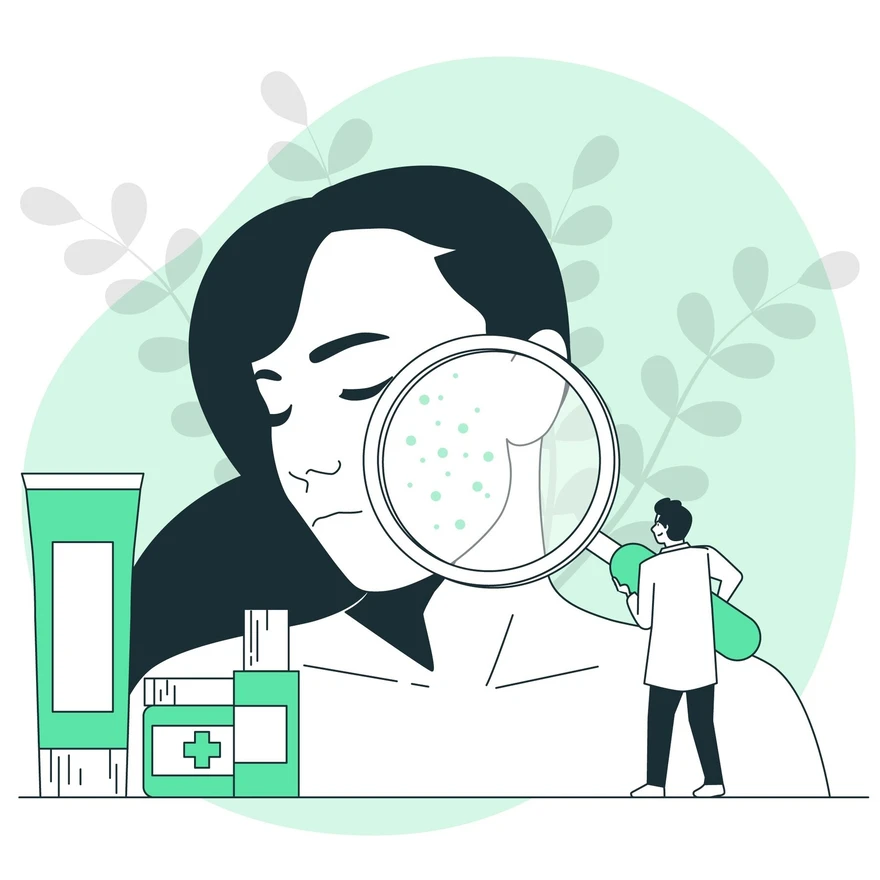Preventive Healthcare
Understanding Ringworm: Symptoms, Causes, Stages, Types & Treatment
1063 Views
0
1715579024.webp)
What is Ringworm?
Ringworm is a fungal infection that affects the skin, hair, or nails. It causes red, circular rashes with raised edges.
What are the Types of Ringworms?
Some common ringworm types include:
- Athlete's Foot: This affects mostly males, causing itching, scaling, and blisters on the feet due to sweating and tight footwear.
- Jock Itch: This is also more prevalent in males. It presents as red, itchy patches in the groin area during warm weather, rarely affecting females.
- Scalp Ringworm: This is highly contagious, especially in children. Symptoms include red rash, itching, and hair loss on the scalp.
- Nail infection: Affects nails, causing thickening and yellowing, more common in adolescents and adults.
- Body ringworm: This is characterised by circular, raised lesions with itching, affecting all ages but more prevalent in children in warmer climates.
How Do I Know If I Have Ringworm?
If you are wondering if you have ringworm, look for a red, scaly patch or bump on your skin. It may appear as one or multiple rings with raised, bumpy, scaly edges and a clear centre. Remember, not everyone with ringworm will have the classic ring pattern.
Who Gets Ringworm?
While ringworm can affect anyone, individuals with weakened immune systems face a higher risk of contracting the infection.
What are the Symptoms of Ringworm?
Ringworm can affect various parts of the body, including the skin, fingernails, and toenails, with symptoms such as itchiness, ring-shaped rashes, redness, scaling, and hair loss. Ringworm symptoms differ by location:
- Feet: Red, swollen, itchy skin between toes, potential blistering on the sole and heel
- Scalp: Scaly, itchy, circular bald patches, more prevalent in children
- Groin: Scaly, itchy, red spots in skin folds of the thigh
- Beard: Scaly, itchy, red spots on the cheeks, chin, and upper neck, possibly crusted or pus-filled, with hair loss
What Causes Ringworm?
Ringworm causes is primarily by a fungus known as dermatophytes, which prefer warm and moist environments. These fungi can spread when individuals come into direct contact with infected people, animals, or objects, causing ringworm.
Is Ringworm Contagious?
Ringworm is contagious and spreads through direct skin-to-skin contact. Transmission occurs through various means:
- Human-to-human: Typically spreads through direct skin-to-skin contact.
- Animal-to-human: Contracted by touching infected animals, common in petting or grooming dogs, cats, and cows.
- Object-to-human: Can spread via contact with objects recently touched by infected individuals or animals, such as clothing, towels, and combs.
- Soil-to-human: Rare transmission occurs through contact with heavily infected soil, usually requiring prolonged exposure.
Will Ringworm Go Away on Its Own?
Yes, ringworm can resolve without treatment, but it may take several weeks to months. However, opting for no ringworm treatment or jock itch can lead to prolonged itching and discomfort.
How is Ringworm Diagnosed?
There are various stages for ringworm diagnosis. A dermatologist can typically diagnose ringworm by visually examining the affected area. They may also inspect other parts of your body, as ringworm can manifest concurrently with conditions like athlete's foot. Additionally, your dermatologist might take a sample of the infected skin, hair, or nail for laboratory analysis. Examining the sample under a microscope allows the doctor to identify the presence of fungi responsible for ringworm.
What is the Best Cure for Ringworm?
The most effective ringworm treatment depends on the location and severity of the infection. However, common treatments include:
- Over-the-counter antifungal creams, lotions, or powders for skin infections like athlete's foot and jock itch
- Prescription oral antifungal medications for severe or scalp infections
- Keeping the affected area clean and dry
- Avoid sharing personal items like towels or clothing
- Practising good hygiene and regularly washing hands
- Treating pets for ringworm if they are carriers.
What’s the Treatment for Ringworm?
Ringworm treatment varies depending on the diagnosis and the severity of the condition-;
Oral Medication
- Non-prescription options include clotrimazole, miconazole, terbinafine, and ketoconazole.
- Prescription options include griseofulvin, terbinafine, itraconazole, and fluconazole.
Antifungal Creams and Powders
- Clotrimazole (Lotrimin, Mycelex)
- Miconazole (Monistat, Micatin)
- Terbinafine (Lamisil AT)
- Tolnaftate (Tinactin)
- Ketoconazole (Nizoral)
Home Remedies for Ringworm
While over-the-counter and prescription treatments are typically the most effective options for treating ringworm, some home remedies may provide relief. Here are some simple home remedies for ringworm:
- Try using diluted tea tree oil directly on the affected area
- Use diluted apple cider vinegar to alleviate symptoms and fight fungal growth
- Apply crushed garlic or garlic oil to the skin to combat the infection
- Coconut oil can be applied to soothe itching and aid in healing
- Apply fresh aloe vera gel to reduce itching and inflammation
- Create a paste with turmeric powder and water, then apply it to the affected area
- Soak the affected area in warm salt water to reduce itching and inflammation
What are the Risk Factors for Ringworm?
Depending upon the ringworm stage, the following factors that increase the risk of ringworm:
- Warm climate
- Close contact with infected individuals or animals
- Sharing personal items
- Wearing tight clothing
- Weak immune system
- Obesity
- Diabetes
Can You Prevent Ringworm?
Ringworm prevention is possible by adhering to the following practices-;
- Maintain cleanliness and dryness of your skin
- Choose footwear that promotes air circulation
- Avoid walking barefoot in communal areas such as locker rooms or public showers
- Keep fingernails and toenails trimmed short and hygienic
What are the Complications of Ringworm?
If left unaddressed, ringworm can extend to different body regions, increasing the risk of transmission to others. Additional complications may include:
- Hair loss and scarring
- Pigmentation changes, especially noticeable on darker skin tones like under the armpits
- Nail abnormalities
- Secondary infections due to bacteria penetrating broken skin
- Majocchi’s granuloma is an uncommon condition where the fungus penetrates deeper skin layers.
Can Ringworm Come Back?
Yes, ringworm can return because the fungi that cause it can stay on the skin for a long time. After treatment, it may come back, so you might need to treat it again.
When to See a Doctor?
Seek medical attention if the rash spreads quickly. Also, if the over-the-counter remedies prove ineffective, or if the rash appears on sensitive areas like the face, scalp, or genitals.
How Does Ringworm Affect Pregnancy?
Ringworm fungus does not affect pregnancy, but you should consult with your healthcare provider before using over-the-counter antifungal creams or powders.
Conclusion
Ringworm is a common fungal infection that can be effectively treated with proper medical intervention. While it may not pose a direct threat to pregnancy, seeking guidance from healthcare providers before using over-the-counter remedies is recommended. At Metropolis Labs, we understand the importance of accurate diagnosis and tailored treatment plans. Our state-of-the-art facilities and experienced healthcare professionals are dedicated to providing comprehensive testing and expert guidance for managing conditions like ringworm. Trust Metropolis Labs for reliable diagnostic solutions and personalized care.
 Home Visit
Home Visit Upload
Upload











1720012827.webp)


1701259759.webp)









 WhatsApp
WhatsApp